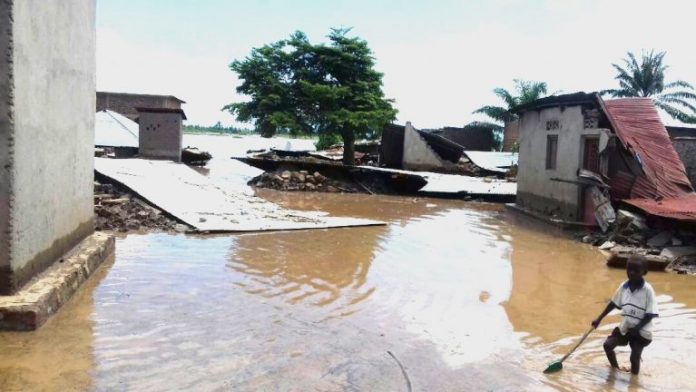River Rusizi busted the banks submerging and damaging homes and properties of the residents living around the lake. PHOTO| FILE
The water level of the Africa’s deepest Lake Tanganyika has significantly increase for the last couple of months as habitants around the lake remain stranded as floods destroys properties and homes.
The inundations occurred on April 30, 2020 that affected more than 27 000 people among which 22 000 children leaving over 6 000 people homeless.
River Rusizi busted the banks submerging and damaging homes and properties of the residents living around the lake.
“For a week we are stranded and we fear for our health due to poor hygiene,” said Maman Queen a flood victim in Gatumba.
“Most of the activities are paralyzed and now transport is done by small boats due to the floods and we pay between BIF 2000 to BIF 5000 (approximately $1 to $2)”, said Emmanuel Harakandi a local administrator in Bujumbura.
The Burundian Government had provided relief aid to thousands of flood victims last week.
Environmentalists have warned that duellers should stop building on the shores of Lake Tanganyika at all costs, and respect the tampon zone which is 150 metres as per the water code of the country.
Lake Tanganyika which is shared by four African countries of Burundi, Democratic Republic of Congo, Tanzania and Zambia is a source of food, drinking water, transport and many other amenities to millions of people who live in the lake basin and beyond second largest lake and second deepest lake in the world.
However the lake have been much affected by the climate change that have seen little or no attention have been put in order to find the best solution for the conservation of the lake, “currently with the problems the lake is facing there have been no significant plan of action or strategies that are already implemented on the ground to combat and tackle the climate change,” said one of the directors of Fisheries at the Lake Tanganyika Authority (LTA).
Lake Tanganyika Authority was esablished in place including all the countries that shares the lake.
Environmentalists say that there is an increase in air temperature and with similar increases in water temperature which has been noted around Lake Tanganyika since the 1960’s, LTA coordinated a lake wide joint fisheries frame survey conducted in 2011 and the survey showed that the number of fishers and fishing vessels had doubled as compared to figures obtained in another lake wide frame survey conducted in 1995.
Burundi government introduced a law that protects water bodies that only allows the construction of private buildings only beyond 150meters away from the lake, the space of 150metres is used for the plantation of trees but only those who got special authorization can build near the lake.
Climate change is probably the most complex and challenging environmental problem facing the world today mainly caused by desertification, air and water pollution. Currently, the intriguing questions include weather uncertainties, persistent climatic abnormalities, rampant environmental degradation and eminent food insecurity. Some of these complexities are exacerbated by increased human population and demand for more agricultural land for food production, which have resulted in destruction of the vegetation cover and subsequently rampant environmental degradation.

